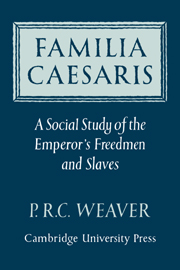Book contents
- Frontmatter
- Contents
- Preface
- Abbreviations
- INTRODUCTION
- PART I NOMENCLATURE AND CHRONOLOGY
- PART II THE FAMILY CIRCLE
- PART III THE EMPEROR'S SERVICE
- 12 Vicarii
- 13 Liberti servus and liberti libertus
- 14 ‘Vicariani’
- 15 The occupational hierarchy: some points of method
- 16 Sub-clerical grades
- 17 Adiutores: junior clerical grades
- 18 Intermediate clerical grades
- 19 Senior clerical grades
- 20 Senior administrative grades: a rationibus, ab epistulis, etc.
- 21 Freedman procurators
- 22 Imperial freedmen and equestrian status: the father of Claudius Etruscus
- CONCLUSION
- APPENDIXES
- Bibliography
- Index
22 - Imperial freedmen and equestrian status: the father of Claudius Etruscus
Published online by Cambridge University Press: 07 October 2011
- Frontmatter
- Contents
- Preface
- Abbreviations
- INTRODUCTION
- PART I NOMENCLATURE AND CHRONOLOGY
- PART II THE FAMILY CIRCLE
- PART III THE EMPEROR'S SERVICE
- 12 Vicarii
- 13 Liberti servus and liberti libertus
- 14 ‘Vicariani’
- 15 The occupational hierarchy: some points of method
- 16 Sub-clerical grades
- 17 Adiutores: junior clerical grades
- 18 Intermediate clerical grades
- 19 Senior clerical grades
- 20 Senior administrative grades: a rationibus, ab epistulis, etc.
- 21 Freedman procurators
- 22 Imperial freedmen and equestrian status: the father of Claudius Etruscus
- CONCLUSION
- APPENDIXES
- Bibliography
- Index
Summary
While the freedman procurators and heads of departments from early in the second century were systematically denied equality of status with their equestrian replacements or counterparts, it occasionally happened that individual freedmen were advanced to membership of the equestrian order itself and full parity of status with the equestrians. In even rarer cases senatorial honours, the ornamenta praetoria and quaestoria, were granted. The main legal barrier which the freedman aspiring to equestrian status had to overcome was that of free birth. Freeborn status (ingenuitas) was conferred by the grant of the anuli aurei, which was in the hands of the emperor, and emperors, both good and bad, in the first and second centuries were very sparing in conferring such free birth on their own freedmen and in admitting them formally to the ordo equester. The very paucity of such instances emphasises the difference in status between the Imperial freedmen in general and the equites, and in particular is an argument against any intermingling of the freedman and the equestrian procuratorial cursus.
Augustus (Cassius Dio, liii. 30.3) granted the anuli aurei to his successful physician Antonius Musa, but there is no need to suppose that he did the same for his notorious procurator in Gaul, Licinus. On the other hand, Antonius Felix was almost certainly an eques when he was appointed procurator of Judaea in 52 and given command of troops there. His brother, Antonius Pallas, was even more highly honoured under Claudius by the ornamenta praetoria decreed him by the Senate in 52.
- Type
- Chapter
- Information
- Familia CaesarisA Social Study of the Emperor's Freedmen and Slaves, pp. 282 - 294Publisher: Cambridge University PressPrint publication year: 1972



